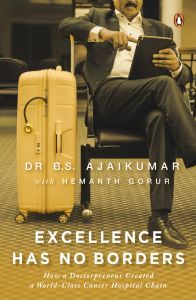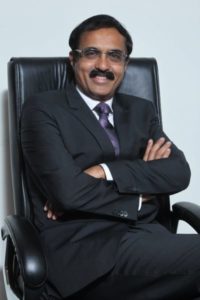Living longer increases cancer incidence

On World Cancer Day (February 4), doctorpreneur and founder of HealthCare Global (HCG) Dr BS Ajaikumar says cancer cases will increase because of the ageing process, environmental issues and the ecosystem we are living in
Saurabh Tankha
He is an oncologist who chose to be an entrepreneur as he wanted state-of-the-art world-class cancer care to reach one and all. He prefers himself being called a doctorpreneur. Founder of HealthCare Global (HCG) which has 30 branches across the country, Dr BS Ajaikumar recently penned Excellence Has No Borders (Penguin Portfolio; pages 234; Rs 699) with Hemanth Gorur that encapsulates his inspiring and captivating journey.
www.lifeand more.in had an exclusive email interaction with the doctorpreneur…
When did the idea to pen this book come and how did manage time to write it?
I’ve always been a good fiction storyteller so my family would always ask me to pen down stories. So I decided that instead of writing stories on fictional imagination, I should write a real one and thought my journey of becoming a doctorpreneur itself all narrative flavours. That is when I thought to pen this book.
When did you decide of turning into a doctorpreneur?
After I finished my residency training in MD Anderson, I had a choice either to work for MD Anderson or become an entrepreneur. So I decided to pursue my own practice and work as a partner. That was the beginning of me becoming an entrepreneur, now what we call as a doctorpreneur. The idea was to have a vision and fulfill it, the way you want.
How easy or difficult is it to be a doctorpreneur? What challenges did you face to reach out to people at the grassroot level?
Having practiced in the US where things are relatively easier in terms of practicing but difficult in terms of identity so, you never have a sense of belonging. Today what we see that racism has been unmasked. I am happy and glad I am not there. Even though, when I was practicing, it was not evident outwardly. Coming to India — you have identity. You are an Indian so the sense of belonging is there but there are other issues. India was very bureaucratic, particularly in the 90s and 2000. That’s around the time when liberalisation was happening. It was more of a socialistic society and there were no encouragement for people to come and invest and be entrepreneurs.
Back then, the interest rates were very high; it was a licence raj, like you need to get license for everything, and most of the people would prefer to be a government employee. Private enterprises were not encouraged; the banks were nationalised, many issues were happening. Hence, it was not a good environment. Even when we borrowed money from a bank, the interest rates were high. We faced a lot of difficulties at one time. We had thoughts like whether this should be closed down but with my partners, we were determined and pumped in some money to make it viable. Fortunately, there are good people as well who do their work with complete dedication and honesty.
To be a successful entrepreneur, one needs to be…?
You have to be a risk taker. As an entrepreneur, you have to be prepared for everything. I see a lot of people saying: first, I want to make sure that my family is protected, only then can I do it. With such thoughts, you can never establish something of your own and it will be better off working for somebody else. I think entrepreneur DNA is different – they are the risk-takers but not foolish. Even if you fail you to learn from it, that is what an entrepreneurship is all about. Success and failure are measured in different ways. Sometimes, a failure itself is a success, it depends on how you interpret and what you are trying to achieve. I look upon myself as a social entrepreneur. I am there to develop and do give back to society. In return, of course, the monetary benefits follow but these should be used properly to enhance ideas and vision.
A study in the Journal of Global Oncology states that cancer cases in the country will double every 20 years. How are we ever going to control or bring down these numbers?
I think essentially in India that cancer cases will increase because of the ageing process, environmental issues and the ecosystem we are living in. Cancer is a lifestyle disease; obesity in the middle class is an issue, and then there is addiction to smoking and chewing tobacco. We strongly advocate against smoking and consumption of tobacco. We have gone to the root cause and made a request to restrict smoking, not only in public places but totally banning smoking. We have filed RTI cases in High Court to see how smoking can be limited. But it is an uphill task because of the vested interest which will always be fighting against it. We have suggested an increase in the tax further, and using that extra tax to help to create better awareness about cancer and treating cancer patients. Some of the disruptive ideas need to be brought in to bring down the incidence of cancer.
According to Mohandas K Mallath of Tata Medical Centre, Kolkata who, along with Robert Smith, a doctoral student at King’s College, London, conducted this study, scientists have established that it is not civilisation but ageing that drives the increase in cancer incidence. With more people living longer, the incidence of cancer is bound to increase in a society, he states. Do you agree?
As I have mentioned above, living longer does increase cancer incidence. But that is not the only reason because we do see cancer in young people, more and more, and particularly cancer like breast cancer. So, it is certainly a lifestyle disease and obesity is the primary cause of cancer. We have to pay importance to obesity and there is a lot of correlation. Now, we see a growing link between diabetes and Alzheimer’s with cancer.
A large number of states in India, the report adds, has a huge gap in demand and supply of cancer treatment facilities. In your opinion, what steps should be taken to bridge this gap, both at the private level and from the government’s end?
The only way we can take this approach to bring about universal healthcare. The government alone will not be able to suffice the prevailing gap alone. The problem with private enterprises they are only in the big cities and for them to penetrate rural areas, the universal healthcare and uniformity of the care has to be there.
The report also mentions that “In the confusion between Centre-State-concurrent responsibilities, patients are suffering. Government should not leave private hospitals to run the cancer care programme. It has been proven beyond doubt that out-of-pocket expenses are far more in private care.” Your opinion…
As addressed above. The issue is not private hospitals and public hospitals. We are all there to provide service. In fact, the amount of charity work private hospital does is not written anyway, because we don’t talk about it. Enormous amount of work is done as cross subsidy. And these kind of out of pocket expenses are really misguided statements and misrepresent what is actually happening. The government because they have couldn’t provide what they should be in healthcare, they are trying to leverage on private healthcare and is the reason why poor quality of care happens, when they give low reimbursement for high quality of care. Today, the healthcare in India is in turmoil, because of actions which the government has taken including price controls and others. So, the answer again is universal healthcare and uninformative healthcare.


